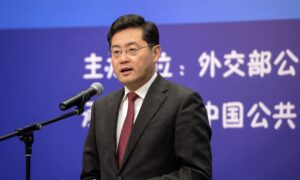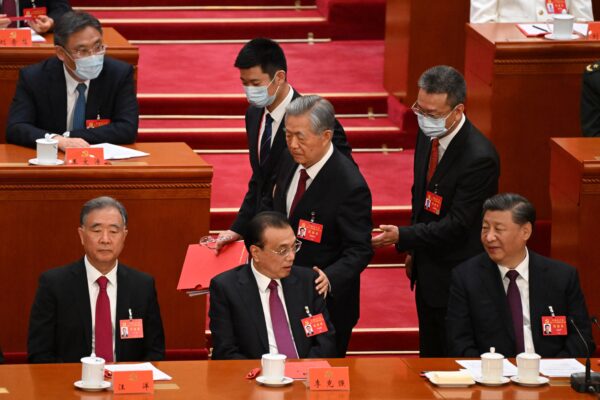Qin Gang Appointed Chinese Foreign Minister During Awkward CCP Power Transition
Recently, former Chinese ambassador to the United States Qin Gang was appointed as China’s Foreign Minister, replacing former Foreign Minister Wang Yi, who was supposed to step down in March when the CCP holds its “Two Sessions” parliamentary-style meeting. China observers say this signals that power transitions between various factions within the ruling party are now in an awkward and confusing period, with replacements being announced significantly in advance of the Two Sessions meeting—breaking common practice within the regime.At the 38th meeting of the CCP’s 13th NPC Standing Committee, which closed on Dec. 30, 2022, the party removed Wang Yi from his duties as foreign minister and appointed Qin Gang. Chinese leader Xi Jinping also signed a decree approving the appointment the same day. Qin Gang, 56, was appointed as China’s ambassador to the United States in 2021, and his promotion within 17 months of assuming the post is a sign of how quickly he has risen through the ranks. At the CCP’ 20th National Congress in October 2022, Qin was unexpectedly elevated to the CCP Central Committee. He was the first Chinese diplomat since Mao Zedong’s time to be promoted directly from an ambassadorial post to the Central Committee. According to China expert and current affairs commentator Shi Shan, the CCP is currently in an awkward transition period. Speaking to The Epoch Times on Jan. 1, Shi said that the last two months of diplomacy have been important for Xi Jinping, who wants to build good relations with the United States. Shi explained that Qin is a relatively soft-spoken figure within the Chinese Foreign Ministry, and his remarks as U.S. ambassador have been much softer than those of former ministers like Wang Yi. Shi further pointed out that the current Chinese leader Xi Jinping’s agenda is not to act super tough on the United States like Wang Yi did. Instead, appointing Qin three months in advance could indicate that Xi Jinping is desperate to adjust the CCP’s policy toward the United States. Li Qiang Gradually Entering Premiership Role The phenomenon of early appointments has not been restricted to the Chinese Ministry of Foreign Affairs. The Central News Agency (CNA) in Taiwan reported on Dec. 27 that the minutes from a pandemic policy meeting were released hours before the official announcement of downgrading the COVID-19 health warning on the evening of Dec. 26. The meeting minutes revealed that Li Qiang and Wang Huaning were appointed head and deputy head of the CCP’s Central Pandemic Policy Group respectively. The CCP’s Central Pandemic Policy Group was established in early 2020, with Premier Li Keqiang as its head and Wang Huaning as its deputy head. This means that Li Keqiang has nominally stepped down from his role as head of the group. China’s President Xi Jinping (R) watches as former president Hu Jintao (C) touches the shoulder of Premier Li Keqiang (2nd L) as he leaves the closing ceremony of the 20th Chinese Communist Party’s Congress at the Great Hall of the People in Beijing on Oct. 22, 2022. (Noel Celis/AFP via Getty Images) Katsuji Nakazawa, former China bureau chief for Japanese media Nikkei Asia, said in a Dec. 22 article that the CCP’s central government’s pandemic policies are confusing and difficult for local officials to implement because there are essentially two command centers in Beijing: one headed by Li Keqiang and the other by Li Qiang. According to the article, every five to ten years, there is some uncertainty about the reshuffling of the CCP leadership. This seems to be happening again. Premier Li Keqiang and Vice Premier Sun Chunlan will no longer be members of the CCP Central Committee after the 20th Party Congress, but they will not retire from their current positions until next year’s Two Sessions. It is important to know that the Central Committee is composed of the most powerful members of the CCP, right next to the dictator Xi Jinping. Li Qiang, who became a member of the Politburo Standing Committe at the 20th Party Congress, is expected to be Premier Li Keqiang’s successor in March 2023. Although Li Qiang has served as the top CCP official in Zhejiang province and in Shanghai, these regional offices are very different from the central government. Li Qiang may still be getting use to the change, Nakazawa wrote. Under normal circumstances, Li Keqiang would have become a “lame duck.” But the pandemic and Li Qiang’s lack of central government experience has meant that Li Keqiang is still commanding attention. Local and provincial officials who receive orders from the central government are not sure whose orders they should follow, with the best way for them to protect their jobs being to do nothing—a typical survival strategy for CCP bureaucrats epitomizing the current confusion during the CCP’s power transition. Jessica Mao is a writer for The Epoch Times with a focus on China-related topics. She began writing for the Chinese

Recently, former Chinese ambassador to the United States Qin Gang was appointed as China’s Foreign Minister, replacing former Foreign Minister Wang Yi, who was supposed to step down in March when the CCP holds its “Two Sessions” parliamentary-style meeting. China observers say this signals that power transitions between various factions within the ruling party are now in an awkward and confusing period, with replacements being announced significantly in advance of the Two Sessions meeting—breaking common practice within the regime.
At the 38th meeting of the CCP’s 13th NPC Standing Committee, which closed on Dec. 30, 2022, the party removed Wang Yi from his duties as foreign minister and appointed Qin Gang. Chinese leader Xi Jinping also signed a decree approving the appointment the same day.
Qin Gang, 56, was appointed as China’s ambassador to the United States in 2021, and his promotion within 17 months of assuming the post is a sign of how quickly he has risen through the ranks. At the CCP’ 20th National Congress in October 2022, Qin was unexpectedly elevated to the CCP Central Committee. He was the first Chinese diplomat since Mao Zedong’s time to be promoted directly from an ambassadorial post to the Central Committee.
According to China expert and current affairs commentator Shi Shan, the CCP is currently in an awkward transition period. Speaking to The Epoch Times on Jan. 1, Shi said that the last two months of diplomacy have been important for Xi Jinping, who wants to build good relations with the United States. Shi explained that Qin is a relatively soft-spoken figure within the Chinese Foreign Ministry, and his remarks as U.S. ambassador have been much softer than those of former ministers like Wang Yi.
Shi further pointed out that the current Chinese leader Xi Jinping’s agenda is not to act super tough on the United States like Wang Yi did. Instead, appointing Qin three months in advance could indicate that Xi Jinping is desperate to adjust the CCP’s policy toward the United States.
Li Qiang Gradually Entering Premiership Role
The phenomenon of early appointments has not been restricted to the Chinese Ministry of Foreign Affairs.
The Central News Agency (CNA) in Taiwan reported on Dec. 27 that the minutes from a pandemic policy meeting were released hours before the official announcement of downgrading the COVID-19 health warning on the evening of Dec. 26.
The meeting minutes revealed that Li Qiang and Wang Huaning were appointed head and deputy head of the CCP’s Central Pandemic Policy Group respectively. The CCP’s Central Pandemic Policy Group was established in early 2020, with Premier Li Keqiang as its head and Wang Huaning as its deputy head. This means that Li Keqiang has nominally stepped down from his role as head of the group.

Katsuji Nakazawa, former China bureau chief for Japanese media Nikkei Asia, said in a Dec. 22 article that the CCP’s central government’s pandemic policies are confusing and difficult for local officials to implement because there are essentially two command centers in Beijing: one headed by Li Keqiang and the other by Li Qiang.
According to the article, every five to ten years, there is some uncertainty about the reshuffling of the CCP leadership. This seems to be happening again.
Premier Li Keqiang and Vice Premier Sun Chunlan will no longer be members of the CCP Central Committee after the 20th Party Congress, but they will not retire from their current positions until next year’s Two Sessions.
It is important to know that the Central Committee is composed of the most powerful members of the CCP, right next to the dictator Xi Jinping.
Li Qiang, who became a member of the Politburo Standing Committe at the 20th Party Congress, is expected to be Premier Li Keqiang’s successor in March 2023.
Although Li Qiang has served as the top CCP official in Zhejiang province and in Shanghai, these regional offices are very different from the central government. Li Qiang may still be getting use to the change, Nakazawa wrote.
Under normal circumstances, Li Keqiang would have become a “lame duck.” But the pandemic and Li Qiang’s lack of central government experience has meant that Li Keqiang is still commanding attention.
Local and provincial officials who receive orders from the central government are not sure whose orders they should follow, with the best way for them to protect their jobs being to do nothing—a typical survival strategy for CCP bureaucrats epitomizing the current confusion during the CCP’s power transition.












